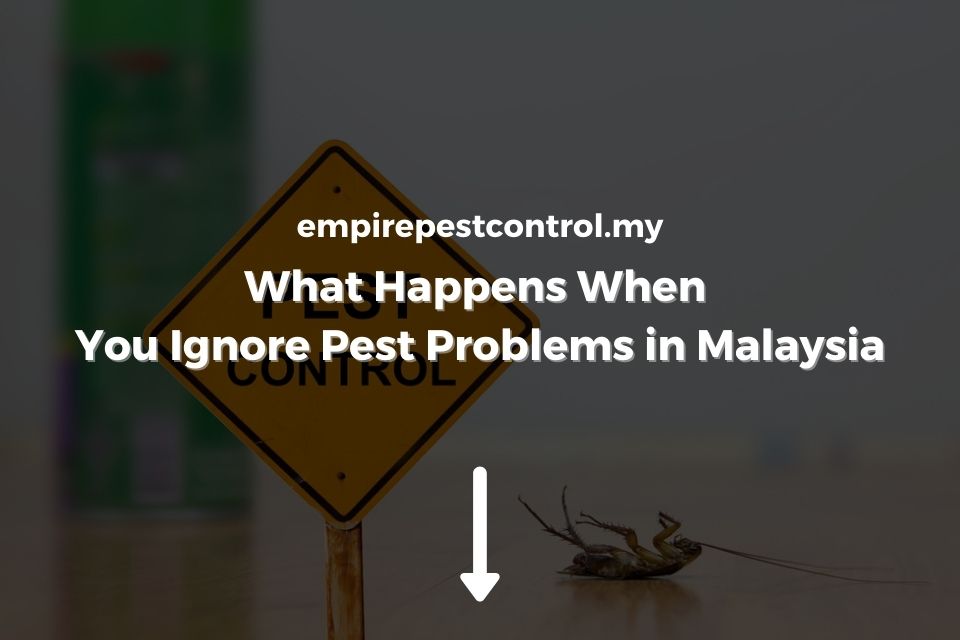Loads of critters, from tiny bugs to sneaky mice, play the villain for farmers, block our food from hitting markets, mess with nature, and turn daily life in Malaysia into a bit of a headache. They gnaw on our plants, spoil our food supply, bug our animals, and become a real bother, not to mention a health risk, for everyone.
Ants, spiders, mites, flies, and roaches are some examples of common household pests. Let’s have a look at how can they affect our daily lives.
P.S. Want to get rid of pest problems? Contact our team of local pest control experts from Malaysia to assist you with all types of pest infestations.
Pests Can Carry Diseases
Pests are a major threat to health worldwide. Serious and fatal, diseases can be easily spread or triggered by pests such as vectors, other insects, rodents, or microbes.
- Malaria is a disease caused by a parasite. The parasite is spread to humans through the bites of infected mosquitoes. People who have malaria usually feel very sick with a high fever and shaking chills.
- Plague is an infectious disease caused by the bacteria Yersinia pestis, a zoonotic bacteria, usually found in small mammals and their fleas. It is transmitted between animals through fleas. Humans can be infected through the bite of infected vector fleas. Individuals affected by the plague have symptoms of cough, bloody mucus (sputum), difficulty breathing, abdominal pain, diarrhea, and vomiting.
- Leptospirosis is a bacterial infection we get from the urine of animals like rodents. You can get this disease if water containing infected urine gets in your mouth, eyes, or wound.
- Dengue is a mosquito-borne viral infection that occurs in tropical and subtropical areas of the world. Mild dengue fever causes a high fever and flu-like symptoms. But the severe form of dengue fever can cause serious bleeding, a sudden drop in blood pressure, and death.
Pest can Affect the Food Industry
It is a fact that everyone needs to eat, and this makes the food industry the strongest in the world. The presence of pests in food production and preparation areas has always been unacceptable. Every company in the food industry must be fully aware of the hazards posed by pests.
- Rodents and mice can urinate and defecate during production. They can also scratch cardboards, woods, and even electrical wirings.
- Houseflies can carry more than 100 kinds of diseases. They can move quickly from garbage to food, processing surfaces, and equipment. This makes everything contaminated by bacteria.
- Cockroaches contaminate food with their waste and saliva which contains bacteria that can cause food poisoning, diarrhea, and other infections
Pest may Cause House Damage
Many pests are tiny in size but their powers may destroy your house from the inside out
- Termites can cause about RM40 million in property to Malaysia each year. Termite colonies, which both live and eat wood, take about five years to grow to the size where they start to cause structural damage to your home. You are very if you can spot and control their colony during this time. Though some species can cause significant issues within six months given the right circumstances.
- Carpenter Ants nest in both moist and dry wood, but prefer. Woods in your home are dampened by water leaks which are usually present around sinks and bathrooms. They may establish nests in several different locations. Carpenter Ants’ whole life revolves around biting and chewing moist and softwood as their hobby. This could potentially cause bodily harm if the structural damage is not taken care of and the building could collapse.
Related Post: How To Protect Solar Panels from Pests
These are a few things that may happen if you ignore pest control in your home. If you find it difficult, always remember that you are not alone in this world full of pests. You may contact Empire Pest Control to help you dealing with this disastrous pest problem. Professionals can do the job effectively and will guide and assist you on how to prevent and control these things happen in your home again.
Jason Tan is a professional pest exterminator with 15 years of experience. He enjoys sharing his knowledge on pest control to help homeowners and business owners to get rid of their pest problems.

